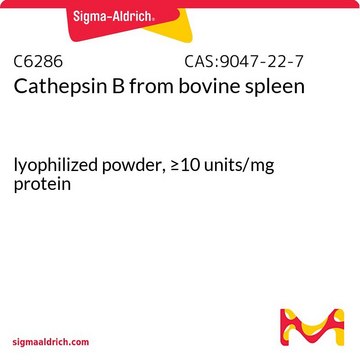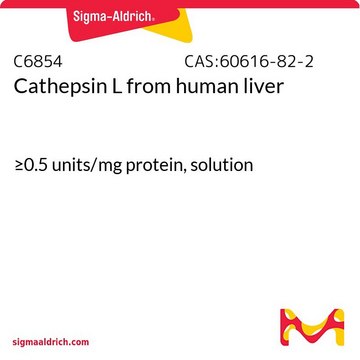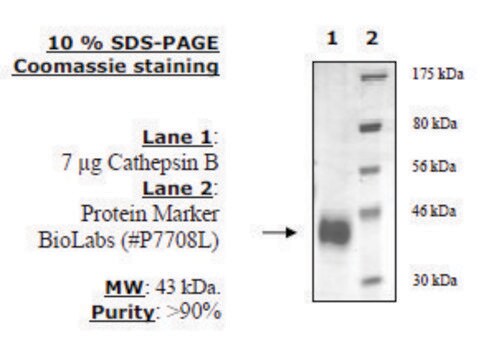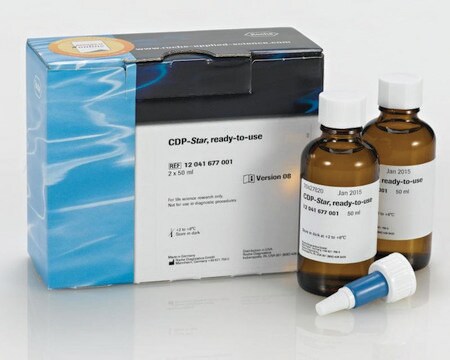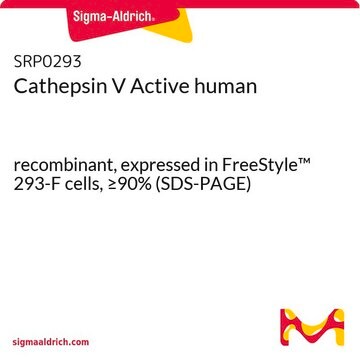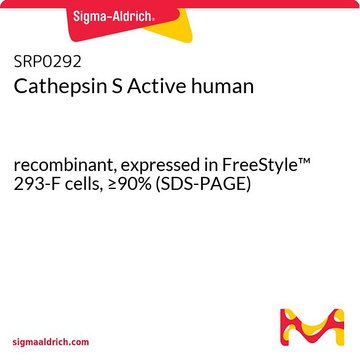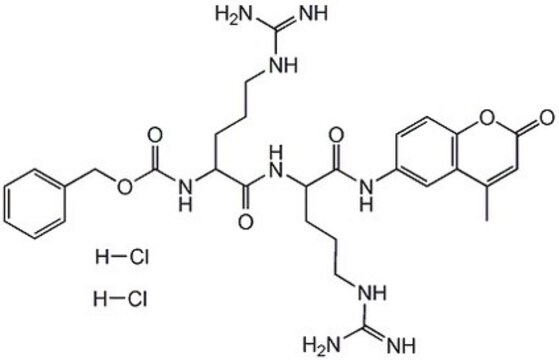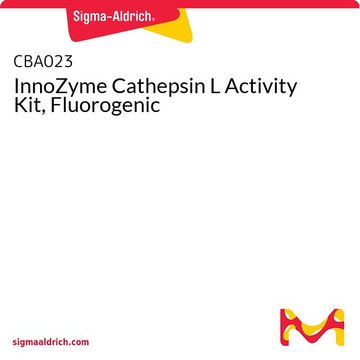C8571
Cathepsin B from human liver
buffered aqueous solution, ≥1,500 units/mg protein (E1%/280)
Synonym(s):
Cathepsin B1
Sign Into View Organizational & Contract Pricing
All Photos(1)
About This Item
CAS Number:
MDL number:
UNSPSC Code:
12352200
NACRES:
NA.32
Recommended Products
biological source
human liver
Quality Level
form
buffered aqueous solution
specific activity
≥1,500 units/mg protein (E1%/280)
UniProt accession no.
shipped in
dry ice
storage temp.
−70°C
Gene Information
human ... CTSB(1508)
General description
Cathepsin B gene is mapped to human chromosome 8p23.1. It is a lysosomal cysteine with 252 amino acids distributed in two chains and is homologous to rat liver sequence. It has disc shaped structure with two domains namely the left-hand ′L′ domain at the amino terminal and right hand ′R′ domain at the carboxyl-terminal.
Application
Cathepsin B from human liver has been used:
- as a positive control in the screening Cathepsin B inhibitor assay
- in wall extension (expansin activity) assay
- in microinjection human foreskin fibroblasts to test its effect on apoptosis induction
Biochem/physiol Actions
Cathepsin B from human liver is highly expressed in the esophageal adenocarcinoma (EAC). It reduces hepatic inflammation and fibrogenesis and may serve as a potential candidate for treating liver diseases.
Cathepsin B has been found to cleave procaspase 1 and procaspase 11 and to induce apoptosis in digitonin-permeabilized cells. Translocation of cathepsin B from the cytoplasm to the nucleus contributes to bile salt induced apoptosis of rat hepatocytes. Levels of cathepsin B in PC12 cells significantly decrease 12 to 24 hours after apoptosis is induced.
Packaging
Package size based on protein content
Unit Definition
One unit will liberate 1 nanomole of 7-amino-4-methylcoumarin from Z-Arg-Arg 7-amido-4-methylcoumarin per min at pH 6.0 at 40 °C.
Physical form
Solution in 50 mM sodium acetate, pH 5.0, with 1 mM EDTA.
inhibitor
Product No.
Description
Pricing
related product
Storage Class Code
10 - Combustible liquids
WGK
WGK 3
Flash Point(F)
Not applicable
Flash Point(C)
Not applicable
Certificates of Analysis (COA)
Search for Certificates of Analysis (COA) by entering the products Lot/Batch Number. Lot and Batch Numbers can be found on a product’s label following the words ‘Lot’ or ‘Batch’.
Already Own This Product?
Find documentation for the products that you have recently purchased in the Document Library.
Customers Also Viewed
Prevention of free fatty acid-induced hepatic lipotoxicity by 18beta-glycyrrhetinic acid through lysosomal and mitochondrial pathways
Wu X, et al.
Hepatology, 47(6), 1905-1915 (2008)
Amino acid sequence of human liver cathepsin B
Ritonja A, et al.
Febs Letters, 181(1), 169-172 (1985)
Genome-wide catalogue of chromosomal aberrations in barrett's esophagus and esophageal adenocarcinoma: a high-density single nucleotide polymorphism array analysis
Gu J, et al.
Cancer Prevention Research (Philadelphia, Pa.), 3(9), 1176-1186 (2010)
The refined 2.15 AX-ray crystal structure of human liver cathepsin B: the structural basis for its specificity.
Musil DJ, et al.
The Embo Journal, 10(9), 2321-2330 (1991)
Cathepsin B inactivation attenuates hepatic injury and fibrosis during cholestasis
Canbay A, et al.
The Journal of Clinical Investigation, 112(2), 152-159 (2003)
Articles
Enzymatic Assay of Cathepsin B
Our team of scientists has experience in all areas of research including Life Science, Material Science, Chemical Synthesis, Chromatography, Analytical and many others.
Contact Technical Service